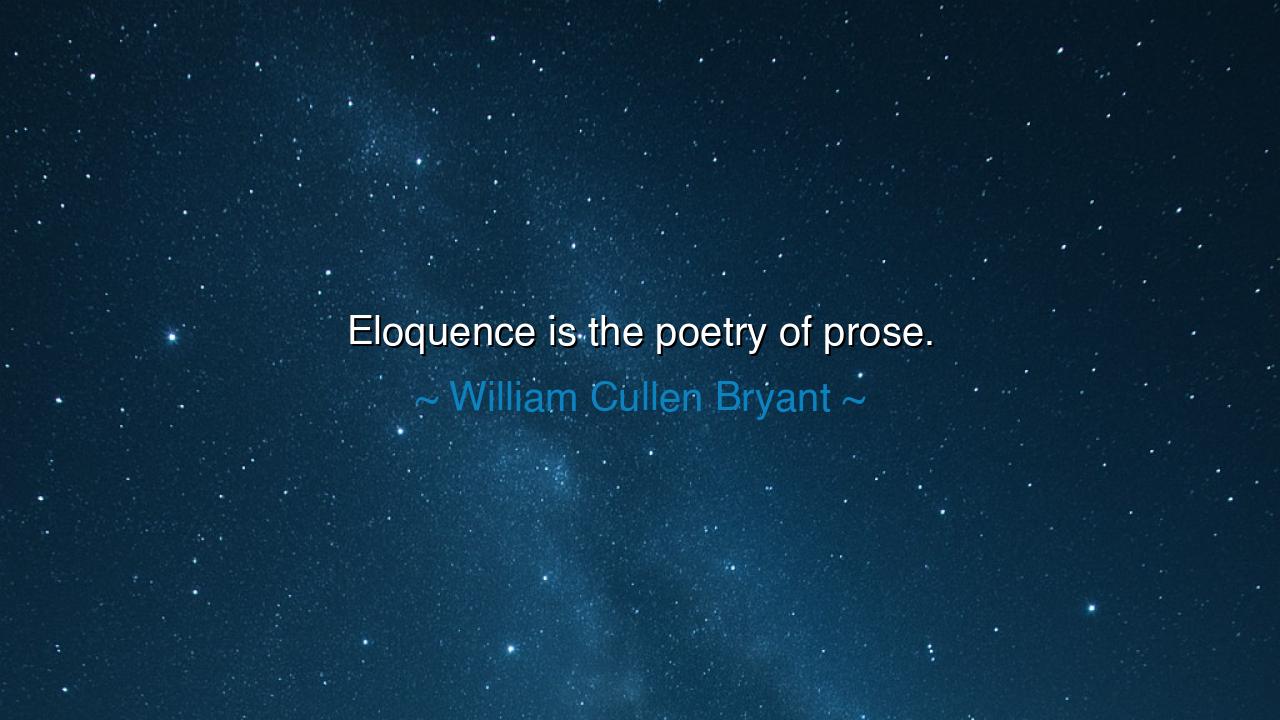
Eloquence is the poetry of prose.






The words of William Cullen Bryant resound with timeless clarity: “Eloquence is the poetry of prose.” In this brief yet radiant saying lies the recognition that speech, when lifted by beauty and truth, transcends mere function and becomes art. Prose may be the common tongue of daily life, but when touched by eloquence, it rises, taking on the rhythm, the grace, and the fire of poetry. It becomes more than communication; it becomes a force that stirs the heart and moves the will.
From the earliest days of mankind, the spoken word has been our mightiest weapon and our most enduring legacy. Before laws were written upon tablets of stone, before chronicles were pressed into clay, the voice of the orator carried justice, command, and inspiration. What was this but prose infused with eloquence—ordinary language ennobled by cadence, imagery, and passion? When Bryant speaks of eloquence as the poetry of prose, he reminds us that the loftiest art is not confined to verse but can be born in every utterance, if spoken with care, rhythm, and truth.
History gives us luminous examples. Recall the words of Pericles, whose Funeral Oration in Athens did not merely list the virtues of the dead, but exalted the very spirit of democracy. He spoke in prose, yet his phrasing and vision were so rich, so elevated, that it lives still as poetry in the annals of time. Consider, too, Abraham Lincoln, who at Gettysburg spoke only a few short sentences, plain in language, but so suffused with eloquence that they became immortal. Here we see the living proof of Bryant’s teaching: prose made eternal by the poetry that dwells within eloquence.
But the gift of eloquence is not born of ornament alone. Empty words, though honeyed, ring hollow and soon decay. True eloquence comes when truth and beauty are wed—when words reflect not only the art of speaking but the integrity of the heart. For this reason, Cicero declared that the perfect orator must be a good man, skilled in speech. Without virtue, eloquence becomes manipulation; with virtue, it becomes a beacon that guides generations.
Let us, then, not relegate eloquence to the realms of statesmen and poets. It belongs to all who speak with sincerity. A mother consoling her child, a teacher inspiring students, a leader guiding their people—each can transform ordinary prose into something poetic through compassion, rhythm, and conviction. Eloquence is not found in elaborate words alone, but in the harmony between soul and speech.
The lesson is clear: cultivate eloquence not as vanity, but as a gift to others. Strive to make your words not only understood, but felt. Let them bear rhythm so they linger, clarity so they instruct, and warmth so they inspire. When you speak, let your voice be more than sound—let it be music, let it be poetry hidden in prose.
Practical actions follow: read the speeches of the greats, not for their fame, but for their cadence; practice speaking aloud until your words flow with both clarity and rhythm; seek truth in your heart before you shape it into sentences. Speak with intention, and write with the same care you would give to song. In this way, even in the simplest exchange, your prose may shine with the light of poetry, and your eloquence may endure beyond your years.






KDdoan khamh duy
This quote really makes me think about the way words can be used not just to inform, but to inspire. Eloquence in prose can transform simple sentences into something memorable, much like poetry does. But can eloquence be taught, or is it a skill that some naturally possess? What does it take for a writer to elevate prose into something that feels as meaningful as poetry?
TLThi Thuc Trinh Le
I love the idea that eloquence in prose can be as powerful and beautiful as poetry. But is eloquence something everyone can learn, or is it a natural gift? It makes me wonder whether we should value eloquence more in everyday conversation, or if it’s only meant for more formal or artistic writing. Could we all benefit from making our words more poetic in how we communicate?
QMTo Quang Minh
This quote highlights the art of eloquence, emphasizing that the beauty of prose can sometimes mirror the lyrical nature of poetry. It makes me think about the role of language in communication. Can eloquence in writing elevate even the most mundane subjects, or is it only suited for specific topics? How do we cultivate this skill to make our writing more impactful?
TN17. 7/5 Thuc Nghi
I find this quote interesting because it draws a connection between two forms of expression: prose and poetry. Both can be beautiful in their own right, but it suggests that when prose is crafted with skill and care, it can reach a level of elegance similar to poetry. How can we incorporate more poetic elements into everyday writing to elevate its power and impact?